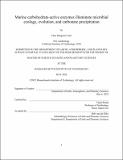Marine carbohydrate-active enzymes illuminate microbial ecology, evolution, and carbonate precipitation
Author(s)
Cutts, Elise Margaret
DownloadThesis PDF (12.96Mb)
Advisor
Bosak, Tanja
Terms of use
Metadata
Show full item recordAbstract
Marine carbohydrate-active enzymes (CAZymes) in microbial mats build, modify, and degrade the matrix of exopolymeric substances (EPS) that structure these ancient ecosystems and control mineral formation via the alkalinity engine and organic surfaces involved in mineral nucleation and growth. Marine microbialites—mineralized microbial mats—preserve the earliest unequivocal evidence of life on Earth and billions of years of the evolutionary history of microbial life. And the gene sequences of marine CAZymes preserve a yet-unexplored record of microbial evolution that can be constrained by the fossil record of major algal lineages. This thesis explores marine carbohydrate-degrading enzymes as molecular-biological windows on microbial ecology, evolution, and mineral precipitation. Section one reviews the application of molecular biological tools to the study of carbonate mineralization in microbial mats and identifies CAZymes as a promising target for future molecular biological studies of microbemineral interactions. Section two provides a brief overview of unique algal polysaccharides that could be used as phylogenomic “standard candles” for dating microbial phylogenies. Section three is an original metagenomic and laboratory study of carbohydrate degradation in a Shark Bay pustular mat community. The combined metagenomic and experimental analyses reveal a widespread potential for EPS degradation among MAGs from Shark Bay pustular mats and suggest distinct roles for many phyla that are reported at high abundances in mats. Taken together, the literature reviews and new results presented in this thesis demonstrate that marine CAZymes are an exciting open frontier in the molecular biology of marine ecosystems. New studies of these enzymes promise discoveries with the potential to illuminate the evolutionary history of microbes—both as preserved in rock record and in the genomes of modern organisms.
Date issued
2022-05Department
Massachusetts Institute of Technology. Department of Earth, Atmospheric, and Planetary SciencesPublisher
Massachusetts Institute of Technology